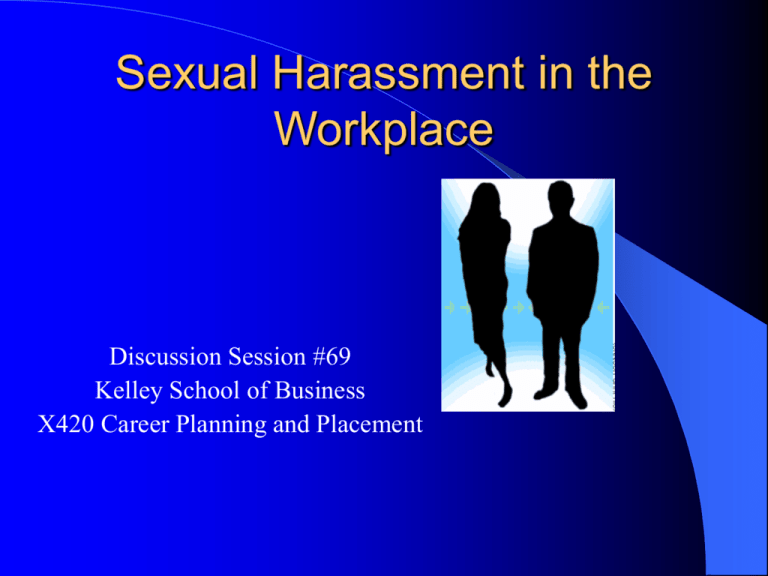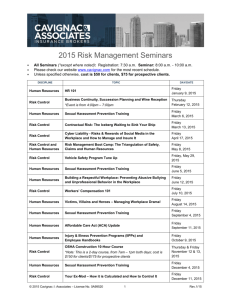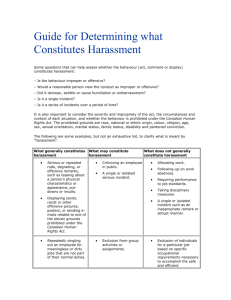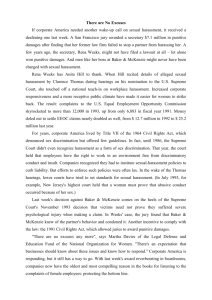
Sexual Harassment in the
Workplace
Discussion Session #69
Kelley School of Business
X420 Career Planning and Placement
Discussion Topics
In this session, you will learn:
How to recognize sexual harassment
What to do if you encounter sexual
harassment
How to prevent sexual harassment in your
work place
Three Kinds of Discrimination
• Adverse Treatment – Intentionally treating
someone different based on their personal
traits, not their ability
• Adverse Impact – Usually and unintentional
form of discrimination where a policy acts to
prohibit qualified people from applying for a
job.
• Retaliation – The targeted person is penalized
or harmed due to a claim that they have filed.
Women and Gender Inequality
June 2000 Wall Street Journal/NBC News survey
on women in the workplace
– finds more than 80% of Americans (and a higher
percentage of men) say women have made considerable
progress over the past generation in jobs.
– Women see progress as too slow with great difficulty in
women advancing to top levels.
– There is discrimination and harassment against working
class women.
– There are serious overall pay inequities.
Women and Business
35 years ago, the Harvard business school had never
graduated a female;
today, almost 40% of business-school graduates are
women and Harvard had 30% female graduates in June
2000
38% of all businesses in America are owned by women
Sexual Harassment:
Is a form of gender-based discrimination
Involves
– unwelcome sexual advances,
– requests for sexual favors, or
– other unwanted verbal or physical conduct of a sexual
nature
Is illegal if it
– becomes a condition of employment,
– affects decisions about a person’s job or career,
– interferes with work performance, or
– creates a hostile work environment
Types of Harassment
- VERBAL, VISUAL OR PHYSICAL
Quid Pro Quo - Requires an employee submit to sexual
harassment to keep their job or to get a promotion
Hostile Work Environment - Unwelcome, repetitive
behavior that is based on sex and gender-related. It
must be severe, offensive, and interfere with job
performance.
Landmark Sexual Harassment Cases: 1998
Faragher vs.Boca Raton upheld a former lifeguard’s verdict
against the city
Burlington Industries Inc. vs Ellerth allowed a woman to sue
her former employer over threats allegedly made but never carried out
In these cases, the court ruled that an employer
could defend itself if
(a) the employer exercised reasonable care
to prevent and correct promptly any sexually
harassing behavior and
(b) the employee failed to take advantage of
any preventive or corrective opportunities
provided by the employer or to avoid harm
otherwise.
Appropriate Dress
The law states that
attire can be used in
court to determine if
sexual conduct is
welcomed or uninvited
Know the appropriate
dress for your work
environment
What To Do If You Encounter
Sexual Harassment
Stay Calm
Explain What Is Offensive
Confront The Harasser
Put It In Writing
Report To Supervisor or Human
Resources
Follow Organizational Procedures
Don’t Delay
Supervisory
Responsibilities
Become educated & educate employees on
what sexual harassment is and what to do
Stop sexual harassment if you see it occur or
hear about it happening
Investigate any claims if they occur
Learn the best ways to interview witnesses
Keep information confidential
Treat victims with respect
Motivation To Harass
Desire to have power over another person
Desire to boost harasser up by having control
over another
Desire to protect turf
Build dominance and superiority
Common Responses
Ignore
Submit
Participate
Act out anger
Be internally angry, but act
appropriately by confronting
harasser and contacting
supervisor or human resources
Sexual Harassers
Some people accused of sexual harassment are
simply clueless, they “don’t get it” and are in
denial of their role….
Watch use of jokes, emails
Think how you would want your
mother/father, wife/husband, sister/brother,
daughter/son treated in same situation
Discussion Questions: Part I
SITUATION A: A female supervisor – Jennifer - attends
a performance review meeting with her manager, Rob.
Rob drops hints that he finds her attractive, and
especially appreciates how her style of dress (business
suit skirts and dresses at mid-thigh, tight sweaters and
blouses) “livens up the office scene.” At first Jennifer
is taken by surprise. Although she is attracted to Rob,
she has not generally thought that it would be a good
idea to date people she works with. But, they agree to
have dinner together after work that Friday.
QUESTION: 1) Is Rob’s behavior considered sexual
harassment in the workplace?
2) What should Jennifer do?
Discussion Questions: Part II
SITUATION B: Jennifer and Rob go out together several times during
the next month or so. They try to be very discreet because the
company’s directors are, as Rob puts it, “real twentieth-century
plods.” Jennifer is undecided about the whole thing, but continues
with the developing relationship. At a certain point, however, she
decides that things have gone far enough. She calls Rob at home to
break things off, and he is distraught. They talk far into the night, but
nothing is really resolved.
The next day Rob asks her to come to his office. He tells her that
he needs her, can’t let her go, and that if she does break it off with him
“she’ll be sorry.” For the next two weeks Rob constantly makes
excuses to come to her workstation, or call her into private meetings.
Each time they talk privately he warns her that he won’t let her “leave
him.” At one point he threatens to fire her.
QUESTION: 1) Is Rob’s behavior considered sexual harassment
in the workplace?
2) What should Jennifer do?
The ONLY test:
Sexual Content + Discrimination =
Sexual Harassment
An employee must demonstrate that the sexual
content they experienced led to discrimination
in the same way as they would if they
experienced race, national origin, or religious
discrimination. This is an important point about
which employers must educate their employees
and supervisors.
How to act if Harassed
Keep your cool and be discreet
Confront the source of harassment
Clearly state that the activity is unwelcome
Document your activities and the harassment
thoroughly
If the harassment does not stop, make an
official complaint to the appropriate
management level
EEOC
The EEOC enforces
Title VII
of the Civil Rights Act of 1964, which prohibits
employment discrimination based on race, color, religion,
sex or national origin;
the Age Discrimination in Employment Act; the Equal
Pay Act; prohibitions against discrimination affecting
individuals with disabilities in the federal sector;
sections of the Civil Rights Act of 1991;
and Title I of the Americans with Disabilities Act, which
prohibits discrimination against people with disabilities in
the private sector and state and local governments.
Further information about the Commission
is available on the agency's web site at
www.eeoc.gov.
Sexual Harassment and Men
Sexual harassment is not limited to male-onfemale harassment in the workplace
"Men account for 11.6 percent
of all sexual harassment cases
filed with the EEOC."
Oncale v. Sundowner Offshore
Services, Inc. -1998
Same Sex Harassment
In the case of Oncale v. Sundowner Offshore Services,
Inc. the Supreme Court ruled that same-sex sexual
harassment is a form of discrimination protected by Title
VII of the Civil Rights Act. The Oncale ruling gave both
the employee and employer victories.
The ONLY test:
Sexual Content + Discrimination = Sexual Harassment
Time Limits
Internal - Organizations typically require initial
reporting 10-30 days after incident(s)
External - Equal Employment Opportunity
Commission requires incidents of sexual harassment be
reported within 180 days or 6 months
Advantages of Lawsuit
Recuperating psychological damages or
loss of wages
Sending a message to organization
Sending a message to community
Disadvantages of a Lawsuit….
• Expensive
• Loss of suit sends unintended
message to community or
organization
• May take a long time and
extensive effort
Sexual Harassment
Prevention
Know the law
Educate yourself on your organization’s policies
regarding sexual harassment
Take steps to set a positive personal example
Take personal responsibility to make sure your
organization has appropriate policies and people
are educated about them
Taking the measure of
sexual harassment…..
After watching each of the videotaped
vignettes, let us consider these questions:
1) Does this situation represent sexual harassment
in the workplace according to the law?
2) If so, what elements make it so? If not, why
not?
3) How should you handle this situation as:
a) The victim
b) The manager
..and now, to the tape…..
After each vignette the class should use the
handout to indicate whether or not the situation
presented can be defined as sexual harassment in
the workplace
Then, we’ll call for a show of hands to see what
the majority opinion is
Be ready to discuss your vote
Voting and discussing your opinion when called
upon is REQUIRED to get credit for this
discussion group
Sexual Harassment:
Discussion #69
Evaluation Questions
USE:
a. Strongly agree
b. Agree
c. Disagree
d. Strongly disagree
e. Don’t know
1. I found the presentation material
easy to understand.
2. This Advantage session increased
my knowledge of the subject presented.
3. I will be able to use some of the
information from this session in the future.
4. The presenter was well prepared for this Advantage session.
5. This presentation should be repeated in future semesters.







